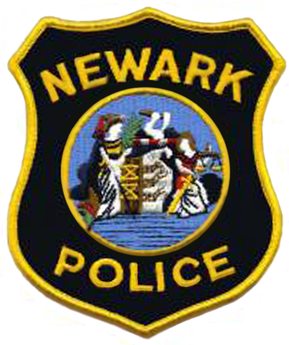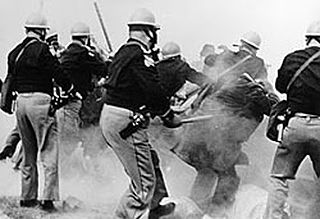
The Keystone Cops are fictional, humorously incompetent policemen featured in silent film slapstick comedies produced by Mack Sennett for his Keystone Film Company between 1912 and 1917.

Police brutality is the excessive and unwarranted use of force by law enforcement against an individual or a group. It is an extreme form of police misconduct and is a civil rights violation. Police brutality includes, but is not limited to, asphyxiation, beatings, shootings, improper takedowns, and unwarranted use of tasers.

The Philippine National Police is the armed national police force in the Philippines. Its national headquarters is located at Camp Crame in Bagong Lipunan ng Crame, Quezon City. Currently, it has approximately 228,000 personnel to police a population in excess of 100 million.

Cops is an American reality legal television documentary programming series that is currently in its 36th season. It is produced by Langley Productions and premiered on the Fox network on March 11, 1989. The series, known for chronicling the lives of law enforcement officials, follows police officers and sheriff's deputies, sometimes backed up by state police or other state agencies, during patrol, calls for service, and other police activities including prostitution and narcotic stings, and occasionally the serving of search/arrest warrants at criminal residences. Some episodes have also featured federal agencies. The show's formula follows the cinéma vérité convention, which does not consist of any narration, scripted dialogue or incidental music/added sound effects, depending entirely on the commentary of the officers and on the actions of the people with whom they come into contact, giving the audience a fly on the wall point of view. Each episode typically consists of three self-contained segments which often end with one or more arrests.
Police misconduct is inappropriate conduct and illegal actions taken by police officers in connection with their official duties. Types of misconduct include among others: sexual offences, coerced false confession, intimidation, false arrest, false imprisonment, falsification of evidence, spoliation of evidence, police perjury, witness tampering, police brutality, police corruption, racial profiling, unwarranted surveillance, unwarranted searches, and unwarranted seizure of property.

The Denver Police Department (DPD) is the full service police department jointly for the City and County of Denver, Colorado, which provides police services to the entire county, including Denver International Airport, and may provide contractual security police service to special districts within the county. The police department is within the Denver Department of Public Safety, which also includes the Denver Sheriff Department and Denver Fire Department. The DPD was established in 1859.

Established in April 1857, the Newark Police Department (NPD) is the primary law enforcement agency serving Newark, New Jersey and the largest municipal law enforcement agency in New Jersey. As of December 2017 the force had 1,146 officers.
These Streets are Watching is a 50-minute video on police accountability in three communities in the United States; Denver, Cincinnati and Berkeley. The video documents incidents that its creators consider demonstrate the unnecessary use of force by the police. Independent filmmaker, Jacob Crawford, weaves the responses made in these three cities to police brutality into a single tale of community empowerment and direct action. The film conveys basic legal concepts that can provide practical help to groups and individuals seeking an understanding of their rights when dealing with police. The film is divided into sections that explain citizen's basic rights, tactics for documenting police activity and ideas for further action.
"Contempt of cop" is law enforcement jargon in the United States for behavior by people toward law enforcement officers that the officers perceive as disrespectful or insufficiently deferential to their authority. It is a play on the phrase contempt of court, and is not an actual offense. The phrase is associated with unlawful arbitrary arrest and detention of individuals, often for expressing or exercising rights guaranteed to them by the United States Constitution. Contempt of cop is often discussed in connection to police misconduct such as use of excessive force or even police brutality as a reaction to perceived disrespectful behavior rather than for any legitimate law enforcement purpose.

Police brutality is the use of excessive or unnecessary force by personnel affiliated with law enforcement duties when dealing with suspects and civilians.
Collective Opposed to Police Brutality (C.O.B.P), also known as Collectif Opposé à la Brutalité Policière, is an autonomous group founded in Montreal in 1995. This organization consists of victims, witnesses, representatives of ethnic communities, marginalized youth, small political groups, the homeless, sex workers, LGBTQ+, drug users, and others who have questions about police authority.

Antonio Buehler is an American educator, entrepreneur, and activist known for his work on police accountability and his pursuit of a more widely recognized constitutional right to photograph, film and document the public activities of police. In 2012, Buehler was arrested in Austin, Texas, for video-recording police after he allegedly witnessed a woman being abused by officers. After the arrest, Buehler co-founded the Peaceful Streets Project, an organization that trains the public to record police activity. Buehler has been arrested a total of seven times, has had twelve criminal charges filed against him, and has had dozens of criminal investigations initiated against him.

Cop Block is a decentralized police accountability project. The organization's members and volunteers attempt to draw attention to alleged or evident police abuses that happen across the United States, and work to film police to force transparency and accountability within their ranks. However, believing that accountability will never end police brutality, the group shifted its focus to the complete abolishment of all law enforcement.
The Ferguson effect is an increase in violent crime rates in a community caused by reduced proactive policing due to the community's distrust and hostility towards police. The Ferguson effect was first proposed after police saw an increase in violence following the 2014 shooting of Michael Brown in Ferguson, Missouri. The term was coined by Doyle Sam Dotson III, the chief of the St. Louis police, to account for an increased murder rate in some U.S. cities following the Ferguson unrest. Whether the Ferguson effect really exists is subject of discussions with many published studies reporting contradicting findings concerning whether there is a change in crime rates, number of 911 calls, homicides, and proactive policing. Furthermore, the effect and influence of the portrayal of police brutality in the media is also contested.

Copwatch is a 2017 documentary film about the Copwatch group of activists. It depicts the organization WeCopWatch, including segments on Ramsey Orta, Kevin Moore, who filmed the police abuse of Freddie Gray, and David Whitt who lived in the apartment complex where Michael Brown was killed, as well as Jacob Crawford, who seeded and co-founded Copwatch groups inspired by the Berkeley Copwatch group. Director Camilla Hall was on the front lines recording the WeCopWatch activists. She describes her film as "a plea for humanity. A plea to look out for each other; to look out for your neighbor. To not walk by when something terrible is happening to somebody else and taking that active decision to look out for one another,"

The George Floyd protests were a series of police brutality demonstrations and riots that began in Minneapolis in the United States on May 26, 2020. The civil unrest, and protests began as part of international reactions to the murder of George Floyd, a 46-year-old African American man, during an arrest. Derek Chauvin, a Minneapolis Police Department officer, knelt on Floyd's neck for 9 minutes and 29 seconds as three other officers looked on and prevented passers-by from intervening. Chauvin and the other three officers involved were later arrested. In April 2021, Chauvin was found guilty of second-degree murder, third-degree murder, and second-degree manslaughter. In June 2021, Chauvin was sentenced to 22+1⁄2 years in prison.

El Grito de Sunset Park is a Puerto Rican activist organization in Brooklyn that has been described as a police watchdog.
Local protests in the Minneapolis–Saint Paul metropolitan area quickly spread nationwide in more than 2,000 cities and towns, as well as over 60 countries internationally in support of the Black Lives Matter movement. In Minneapolis, destruction of property began on May 26, 2020, with the protests involving vandalism and arson. Demonstrations in many other cities also descended into riots and widespread looting. There was police brutality against protesters and journalists. Property damage estimates resulting from arson, vandalism and looting ranged from $1 to $2 billion, eclipsing the highest inflation adjusted totals for the 1992 Los Angeles riots.

This is a list of protests that took place in San Diego County, California following the murder of George Floyd that took place on May 25, 2020 in Minneapolis, Minnesota, after police officer Derek Chauvin knelt on his neck for 9 minutes and 29 seconds. These events were created to fight for justice for George Floyd and other Black community members who suffer from Police brutality. These demonstrations resulted in a number of policy changes, namely the ban of the cartoid neck restraints use in San Diego County and a city-wide independent review board that would review police practices.















